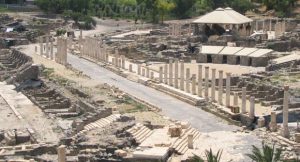by Lois Tverberg
Enter through the narrow gate; for the gate is wide and the way is broad that leads to destruction, and there are many who enter through it. For the gate is small and the way is narrow that leads to life, and there are few who find it. (Matthew 7:13-14)
As we walked through Israel, the contrast was striking between the humble Jewish villages and the imposing Roman cities. The Jewish community in the village of Capernaum lived in simple basalt houses that were close together, and often were a maze of rooms that were added as the family grew. A synagogue was centrally located in the town, suggesting that faith and family were what mattered most here.
In contrast, a few miles away, the Roman city of Beth Shean had a large theater and public bath houses, and a wide central street (cardo) that was lined on both sides by ornate columns, showing visitors the glory of the Roman culture that built it. In fact, the Romans made a point of constructing enormous gates with statues to emperors and pagan gods, and widening roads for their chariots and armies. All of their construction was intended to convince the onlooker that their way of life was superior to all other ways.
One scholar suggests that Jesus may have been thinking of the Roman gates and roads when he spoke about the wide roads that lead to destruction, and how alluring they are compared to the narrow old paths. He may even have been speaking of the Temple, whose gates were ornate, but narrow in comparison to the massive entrances into the pagan poleis.
As Jesus watched wealthy Gentiles arrive at the opulent city gates of Beth Shean, he knew they were literally walking into a life of futility – thinking only of wealth and politics and social standing, and worshipping lifeless gods that could not save. Jesus knew that the humble paths into the Jewish towns led to synagogues where the words of the true God could be read. And inside the narrow gates of the Temple were the courts where prayers were offered to the God who actually could answer.
Jesus, of course, was especially talking about what it is like to follow him. It is a narrow, humble path that few choose to follow, in contrast to the wide colonnades of wealth and glory that attract the rest of the world. But, surprisingly, the old, dusty road that this Rabbi trod is ultimately the path that leads to life, now and in the world to come.
Based on an article by Michael Knowles of McMaster Divinity College, in the Journal of Greco-Roman Christianity and Judaism (2000) p 176-213


